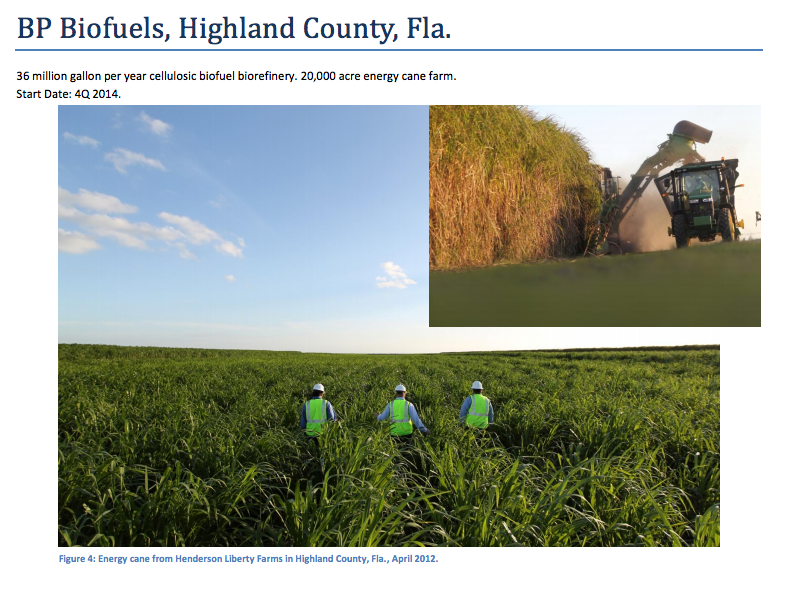UK-based fuel giant BP seems to have caved-in to biofuel market pressures (and investor pressures) as it announced today that it will end its pursuit of commercial-scale cellulosic ethanol production in the US.
BP said it is cancelling its plans to build a commercial-scale cellulosic ethanol facility in Highlands County, Florida, and it will instead refocus its US biofuels strategy on research and development as well as licensing its biofuels technology. I guess there goes the promised 200 jobs in Florida…
 |
| Photo credit: BIO |
The company originally planned to build the 36m gal/year cellulosic ethanol facility in 2008 with the intention of using 20,000 acres of energy cane crops for feedstock. The facility was expected to open in the fourth quarter of 2014.
BP said it still continues to operate its biofuels research facility in San Diego, California, and a 1.4m gal/year demonstration plant in Jennings, Louisiana, to further develop next generation cellulosic biofuel technologies.
“Given the large and growing portfolio of investment opportunities available to BP globally, we believe it is in the best interest of our shareholders to redeploy the considerable capital required to build this facility into other more attractive projects,” said Geoff Morrell, BP vice president of communications.
By the way, the Florida biofuel project started in 2008 when BP formed a 50-50 joint venture with Verenium back then, and it bought Verenium’s biofuel business for $98.3m in 2010, which included the demonstration plant in Louisiana, and the R&D centers in San Diego.
That must have been a lucky break for Verenium to be able to sell the business in time, although investors back then were already doubting the deal as Verenium’s cellulosic ethanol technology was said to be already lagging behind its competitors
BP noted that it has invested more than $7bn in alternative energy over the last five years, and of that, $4bn was in the US. It’s emerging business and ventures unit also has a $160m investment portfolio on sustainable energy technologies.
In the UK, BP has just completed construction of its 110m gal/year cellulosic ethanol plant in Hull, England, in joint venture with DuPont and AB Sugar under the name Vivergo Fuels. The Hull facility is expected to come online later this year. In Brazil, BP has three sugarcane ethanol mills and the company is said to be expanding production in the region.
BP also has a partnership with DuPont on bio-based isobutanol for fuel application through the Butamax joint venture. Butamax is already producing bio-butanol at a demonstration plant in Hull, England, and its strategy is to convert existing ethanol plants into producing bio-butanol.
BP also has a partnership with DSM (via Martek Biosciences) on a second generation biodiesel (sugar-to-diesel) research. Too bad this news from BP came out a few hours after I attended DSM’s biofuel/biobased chemicals roundtable today in New York City.
I will write more about DSM’s biofuel developments as well as in bio-based chemicals in another post.
To finish BP’s biofuel saga, other recent ventures that the company invested in for second generation biofuels development include Cool Planet Biofuels, Verdezyne, and Chromatin.
It does seem that the advanced biofuels industry has to overcome big challenges ahead especially if big oil firms such as BP and Shell seem to be redirecting its biofuels focus, from a producer to just a developer/technology licensor.
In April, this year, Dutch oil firm Shell also scrapped its plans for a commercial cellulosic ethanol project in Manitoba, Canada, in partnership with Iogen. Shell also severed its biofuels research collaboration with enzymes developer Codexis.
So far, French oil firm Total seem to be still holding on with its investment in US cellulosic ethanol firm Coskata. ExxonMobil is now on its third anniversary with its algae project in a partnership with Synthetic Genomics.
Despite the fact that big oil firms claimed to have invested billions of dollars in alternative energy developments, environmental skeptics may have the reason to doubt their sincerity if several more news of shelving renewable energy plans will keep popping up.
Discussion
Comments are closed.